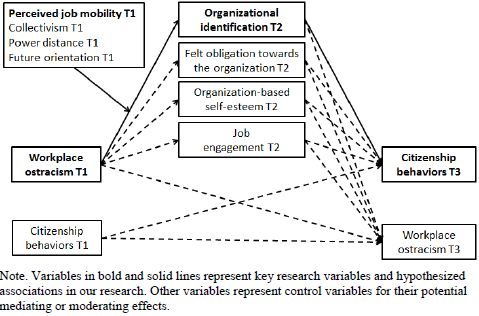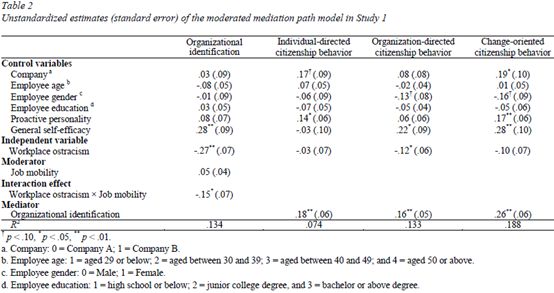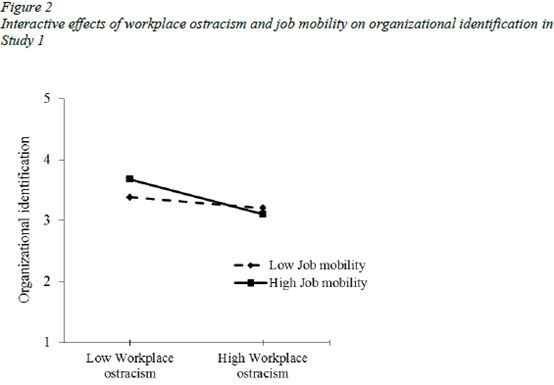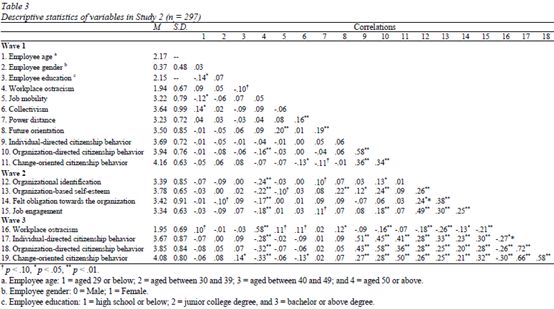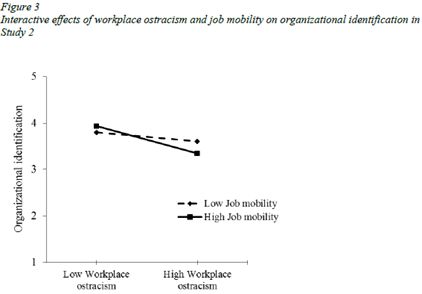Why and when do employees respond to workplace ostracism by withholding their engagement in citizenship behavior?Beyond perspectives proposed in past studies, we offer a new account based on asocial identity perspective and propose that workplace ostracism decreases citizenship behavior by undermining employees’ identification with the organization. We also theorize that perceived job mobility influences the extent to which employees identify with the organization when being ostracized. These hypotheses were examined in two time-lagged studies conducted in China.The proposed hypotheses were supported by results in Study 1, and findings were generally replicated in Study 2, where effects of other known mediators(i.e., organization-based self-esteem, job engagement, and felt obligation towards the organization) and moderators (i.e., collectivism, power distance,and future orientation) suggested by previous perspectives were controlled.Results of Study 2 provided further support of the hypothesized directional effect of workplace ostracism on citizenship behavior via organizational identification. Our studies support the identification perspective in understanding workplace ostracism and also strengthen the application of this perspective in understanding workplace aggression broadly.职场排斥通过破坏员工的组织认同进而抑制了公民行为,此外工作流动性调节职场排斥与组织认同的关系。研究1中本文假设已经得到支持,研究2强调了变量之间影响的方向性并检验了其它变量。
职场排斥定义,带来不好的结果(由满意度、离职意愿到心理情绪,再到绩效和行为)。但是也有研究证明职场排斥可能带来积极影响(e.g., Derfler-Rozin, Pillutla, & Thau, 2010; Williams & Sommer, 1997).因此这个问题值得研究。
当前的研究情况:自尊视角,资源耗竭理论,社会交换理论,社会困境理论等理论。
但现有研究没有从认同这一视角出发,因为公民行为需要内在动力,对集体的认同可以使员工突破自我利益。组织排斥对个体概念的影响并没有被深入揭露。
本文的研究目的是从组织认同的角度解释工作排斥对公民行为的影响,聚焦组织认同的中介作用。解释组织认同原理,并概述4个变量之间的关系。
本研究的4个贡献,前两个是组织认同视角和工作流动性的调节。
第三个是检验了亲和型和变革型的组织公民行为。
第四个贡献是拓宽了工作场所侵害的研究,如辱虐管理和员工道德行为,欺凌行为和工作满意度等,重点研究了不同侵害行为造成的不同行为结果,建立了新的模型框架研究侵害的后果。
Theoretical Background and Hypothesis Development
Workplace Ostracism and Citizenship Behavior: The Mediating Role of Organizational Identification
组织认同的几个原则,定义,与其他认同的区别。
组织排斥影响组织认同的原因,第一,职场排斥带来与他人的分化,进而减少了相似性。
第二,组织认同是一种归属感,职场排斥影响了员工的归属感。
第三,职场排斥影响了员工的价值感。
组织认同对三种组织公民行为有正向影响。
H1 Organizational identification mediates the negative relationship between workplace ostracism and citizenship behavior.
The Moderating Role of Job Mobility in the Association between Workplace Ostracism and Organizational Identification
提出工作的流动性强化或弱化职场排斥对组织认同的作用。工作流动性定义。当流动性低时排斥对认同的影响。
高工作流动性时的情况。
二者比较。
H2: Job mobility moderates the relationship between workplace ostracism and organizational identification, such that the negative relationship is stronger when employees are higher in job mobility.
整合框架,中介和调节。
H3: Job mobility moderates the mediation effect of organizational identification on the relationship between workplace ostracism and citizenship behavior, such that the mediation effect is stronger when employees are higher in job mobility.
The Present Studies
使用2次调研检验假设,研究1中研究了职场排斥对公民行为的影响,研究2中检验了控制了其它中介和调节变量。
组织认同是一个较为稳定的变量,所以滞后了6个月。
Study 1
Method
Participantsand Procedure
数据来自中国2大石油公司,3波数据。第一次测量基本信息,职场排斥,流动性和控制变量(主动性人格),6月后第二次测量组织认同和控制变量(自我效能),6月后测量主管打分的公民行为。
1个主管3名下属,244主管732员工。
最终数据包括282员工,150主管。
Measurement
5点量表
Results
Confirmatory Factor Analyses
Hypothesis Testing
使用Mplus7 (TYPE = COMPLEX, ESTIMATOR = MLR in Mplus)来检验,首先检验中介作用,其次检验调节作用。
假设123都被支持
虽然假设得到支持,但有一些限制。
第一,认同是否是独特的机制,需要再研究2中检验obse,工作投入和义务感。
第二,需要检验职场排斥对公民行为的因果关系。
第三,样本来自中国,需要考虑文化因素,控制集体主义,权力距离等变量。
第四,员工可能受未来导向的影响而不会离开公司,需要考虑这一点。
Study 2
Method
Participants and Procedure
类似于研究1
Measurement
Results
Confirmatory Factor Analyses
Hypothesis Testing
Discussion
控制其它中介作用,认同的作用仍然显著。
其它的调节作用不显著,说明工作流动性确实起到了重要作用。
职场排斥确实影响公民行为,反之不行。
General Discussion
从一个新的角度理解职场排斥对公民行为的影响。
工作流动性的影响。
Limitations
Practical
Implications
Wu,C. H., J. Liu, H. K. Kwan and C. Lee (2016). "Why and When Workplace Ostracism Inhibits Organizational Citizenship Behaviors: An Organizational Identification Perspective."Journal of Applied Psychology 101(3).
